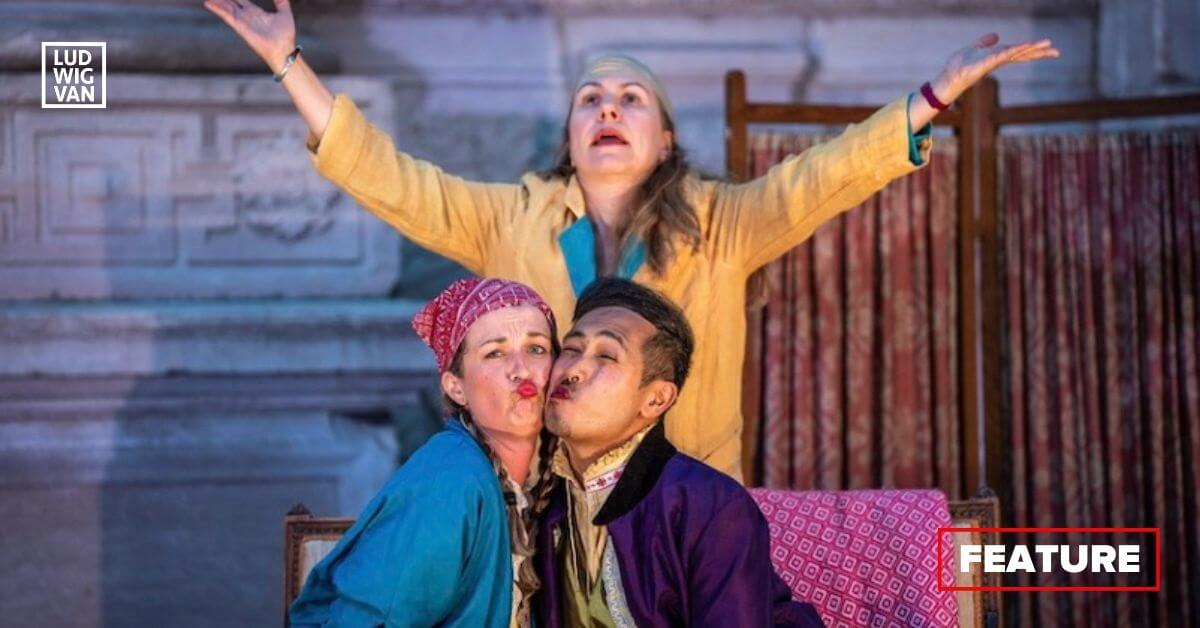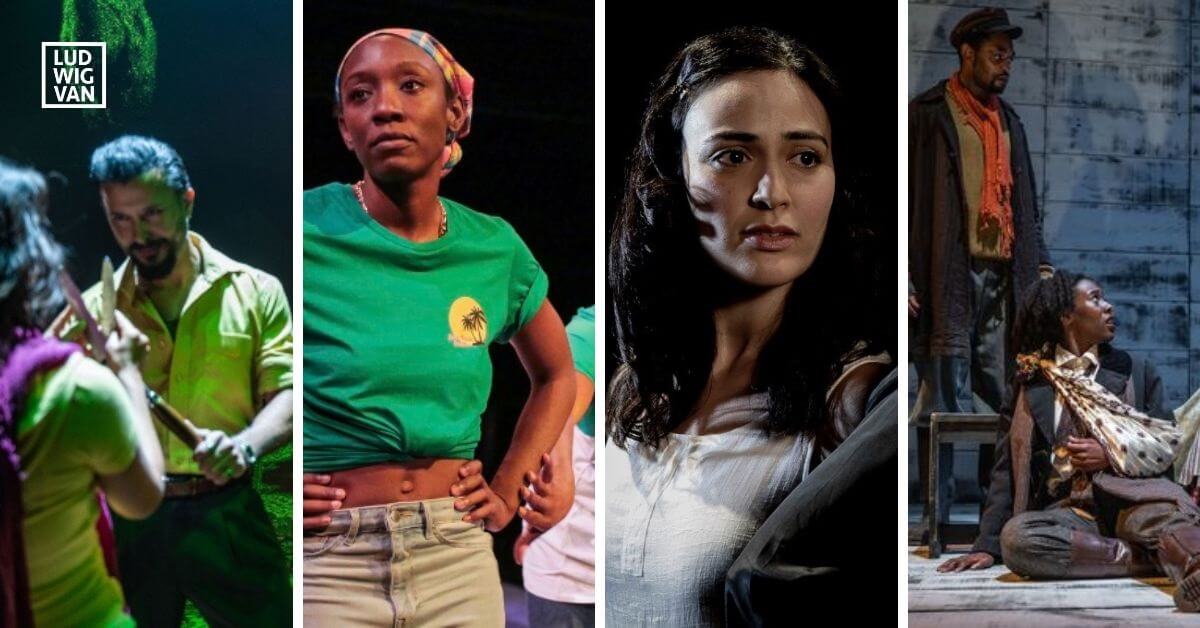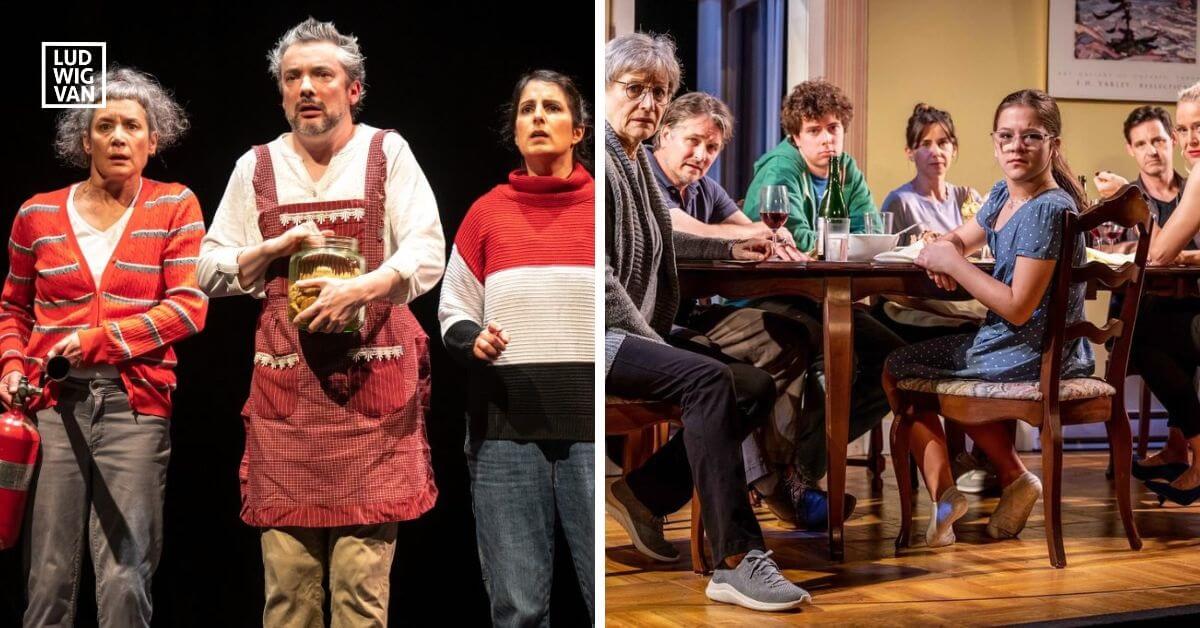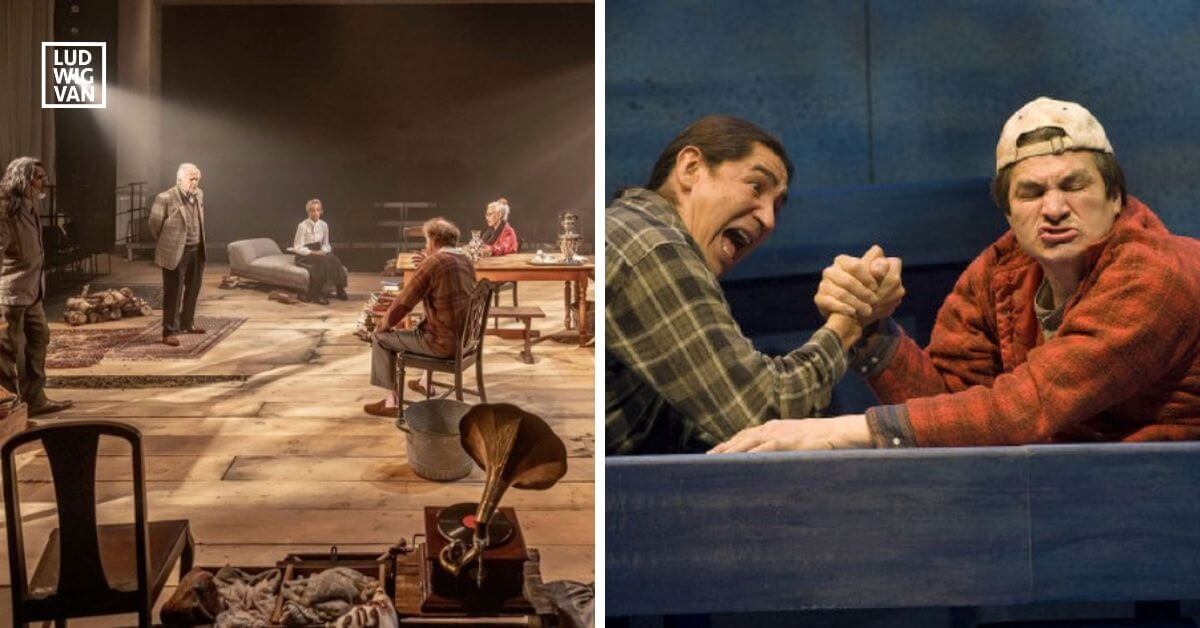
When one creates a “best” list, how one arrives at said list should be recorded, or justified, as it were. One of my chief criterium is, how well do I remember the show? If the production floods into my mind when I see the play’s name, it was either very good, or very bad.
As well, it’s a total production thing — the script, the directing, the acting, the production values — how they all meld together. Now, many productions may have one or more of these strong elements, but to make the list, all have to be there.
Finally, the enjoyment factor — which also means a disturbing experience as well as a positive one. Was being in the theatre for that performance a rewarding one?
By way of explanation, I don’t like ranking, so my best list is in alphabetical order. As for the number 11, I could not find one to eliminate after agonizing for hours, so I caved, and made it one over.

Toronto’s Top 11 Best Theatre Productions of 2022
Bengal Tiger at the Baghdad Zoo
By Rajiv Joseph, directed by Rouvan Silogix (Crow’s Theatre & Modern Times Stage Company)
Bengal Tiger at the Baghdad Zoo is taut, satiric, surreal, relentless and breathtakingly brilliant. It’s best described as expressionism writ large with a highly original plot. The play takes us back to the Iraq war’s early days in 2003 when the collision of cultures was still fresh and raw, and where we meet both US marines and Iraqis of various stripes — and a tiger. Theatre should provoke, but this play goes well beyond that.
Chekhov’s Shorts
Adapted by Helen Juvonen & Tyler J. Seguin, directed by Tyler J. Seguin (Guild Festival Theatre)
The standing ovation was instantaneous because it had been a near perfect evening of theatre. Juvonen and Seguin wrote their own clever scripts for four of Chekhov’s best known short plays or vaudevilles, as the playwright called them, to which they added gorgeous Russian folk tunes. How lucky they are to have found three uber-talented young actors who can also sing and play instruments. The laughs just kept coming. An added bonus is that GFT performs at the Greek Theatre, the most beautiful outdoor venue in the GTA.
Indecent
By Paula Vogel, directed by Joel Greenberg (Off-Mirvish & Studio 180)
Indecent is a play within a play, and is anchored in real life. On one hand, we follow Sholem Asch as he writes his play God of Vengeance. On the other, we see the controversy surrounding God of Vengeance because it shows the lead character (a brothel owner) in a bad light. The question is, does portraying bad Jews contribute to anti-Semitism? It was the New York Jews who caused the Broadway production to be closed down, and the producer, writer and cast arrested. Very disturbing and unsettling.
Is God Is
By Aleshea Harris, directed by Mumbi Tindyebwa Otu (Canadian Stage, Necessary Angel Theatre Company & Obsidian Theatre)
This play can out-revenge the most bloody and nasty Jacobean revenge play by a country mile. Two Black twin sisters are sent by their battered and burned mother to kill their estranged father. It is a killing spree that shows no mercy to the audience. Harrowing doesn’t even begin to describe the experience. Just what is playwright Harris saying in her lurid, shocking yet exhilarating play? Are these young killers finally breaking the cycle of violence against Black women? Is it wishful thinking?
Orphans for the Czar
By George F. Walker, directed by Tanya Jacobs / Inspired by Maxim Gorky’s 1908 novel The Life of a Useless Man (Crow’s Theatre)
Provocative, funny, sobering, clever and vastly entertaining are just a few words to describe this play. The bulk of Walker’s canon concerns the marginalized who live on the fringes of society, and the anti-hero in Orphans exists right at the bottom of the Russian ladder. It’s through his eyes that we see the corrupt forces that will lead to the First Russian Revolution of 1905. This production manages to show both the horrors of poverty and the cruelty of an oppressive police state, and all with laughter.
Our Place
By Kanika Ambrose, directed by Sabryn Rock (Theatre Passe Muraille & Cahoots Theatre)
This groundbreaking play is written in the thick patois of the Caribbean, and the stream of language is relentless. The play is théâtre verité at the extreme, and can almost be classed as docudrama. The setting is a jerk fast food place in Scarborough where we meet an undocumented worker, and another who is about to become one. Both women have left children behind in the islands whom they are supporting. Ambrose’s text is so intense, so searing and so realistic, that we actually feel their pain in their struggle for survival.

Public Enemy (Ennemi public)
By Olivier Choinière, directed by Brendan Healy / Translated and adapted by Bobby Theodore (Canadian Stage)
Choinière’s take on humanity is sharp, acerbic, incisive, provocative and surprising. For this play, he employs the oft-used trope of the family dinner. We first see the adults and their overlapping conversations. The stage then revolves so we see the teenage cousins in the living room. A third revolve shows us the condo’s balcony. A further surprise is the family one year later. Clearly, Choinière’s damaged fictional family is a metaphor for society’s rot as a whole. These wonderful plot twists, and these rather unlikable people, both captivate and repel.
The House of Bernarda Alba
By Federico Garcia Lorca, directed by Soheil Parsa / Translated by David Johnston (Aluna Theatre & Modern Times Stage Company)
Breathtaking in its dramatic sweep! Harrowing in its impact! Parsa’s magnificent production is simply among the finest interpretations of this classic 1936 play ever mounted in this city. Bernarda is the martinet who controls her five daughters with an iron fist. They seethe with repressed sexuality, and chafe under Bernarda’s yoke. Their blighted lives are fraught with tension. In this house of women, we see the impending disaster that this collision of sisters will create. Parsa’s directing gives us theatre at its most overwhelming, and we are caught in its depths.
Uncle Vanya
By Anton Chekhov, directed by Chris Abraham / New Adaptation by Liisa Repo-Martell (Crow’s Theatre)
Director Abraham has given us an Uncle Vanya for the ages. This magnificent production is a joy to behold on every level, be it acting, set, lighting or sound, propelled by Tom Rooney’s complex portrayal of the eponymous character. Repo-Martell’s brilliant adaptation flows easily off the tongue in true naturalistic fashion. The daring set by Julie Fox and Josh Quinlan is in the round, and the audience is so close to the actors that it seems we are living with them. Chekhov called his play comedies, and this adaptation did produce a few smiles, even chuckles, unlike other completely depressing Vanya experiences.
Where the Blood Mixes
By Kevin Loring, directed by Jani Lauzon (Soulpepper & Native Earth Performing Arts)
This play premiered in 2008 and won the Governor General’s Award the following year. Fully 15 years later, it is as relevant today as it was then, perhaps even more so. The residential school experience is the ghost haunting the lives of Floyd and Mooch. Through the humorous banter of these two friends, dark spots soon appear. Very funny scenes begin to slide into traumatic ones. Painful memories are soon exposed, and have to be dealt with as tensions mount. Loring goes behind the headlines to delve down into the souls of Floyd and Mooch, in order to reveal the inner turmoil of the survivors.
Wildfire
By David Paquet, directed by Soheil Parsa, Translated by Leanna Brodie (Factory Theatre)
Two plays directed by Soheil Parsa in one season, and both completely different! Paquet’s remarkable Wildfire is Theatre of the Absurd where seemingly ordinary people are placed into irrational and illogical situations. I say remarkable because Paquet has crafted six utterly endearing characters who draw us into their absurdist lives, and hold us fast. Paquet has peppered his script with ironic and sometimes hilarious dialogue where seemingly idiotic pronouncements have the ring of truth. That is the brilliance of Wildfire — the play literally sucks the audience into the chaos, yet like all great absurdist drama, Wildfire runs deep.

Five Honourable Mentions (in alphabetical order)
Beautiful Renegades, by Michael Ross Albert, directed by Eda Holmes, concept and choreographic direction by Peggy Baker (Peggy Baker Dance Projects)
Baker’s moving love letter to the 1970s Toronto iconoclasts and 15 Dance Lab, who broke all the rules about dance convention, and blazed the trail to post-modernism and freedom of expression.
Cockroach, by Ho Ka Kei/Jeff Ho, directed by Mike Payette (Tarragon)
An expressionistic play of immense imagination that is a coming of age tale about a gay and troubled teenage boy. Wonderfully choreographed by Hanna Kiel.
Crippled, by Paul David Power, directed by Danielle Irvine (Power Productions & Theatre Passe Muraille)
A Governor General’s Award nominee, this touring show from Newfoundland is a moving account of a disabled and heartbroken gay man with suicidal thoughts.
Moby Dick, directed and created by Yngvild Aspeli (a French/Norwegian Plexus Polaire production & Why Not Theatre, part of Harbourfront’s Nordic Bridges)
This dazzling feast for the eyes features seven actors, 50 puppets, video projections and original onstage music that brilliantly captures the battle between man and nature, inspired by Herman Melville’s classic novel.
Red Velvet, by Lolita Chakrabarti, directed by Cherissa Richards (Crow’s Theatre)
Riveting tale of Afro-American Ira Aldridge, the first Black actor to play Othello in London in 1833. Aldridge was subjected to vicious personal prejudice, which makes his world a mirror of society at large, then and now.
The bottom feeder
The award for the season’s worst production goes to the touring Human Measure (Canadian Stage). The works of the transgender artist Cassils are in major galleries worldwide, so we are not dealing with chopped liver here. Nonetheless, Human Measure, which purportedly straddles dance, the history of photography, and French artist Yves Klein’s Athropometries, was mind crushingly boring, particularly watching the six trans performers develop a large cyanotype in real time, which meant washing and turning the canvas in a water bath for an eternity. Pretentious twaddle, pure and simple.
#LUDWIGVAN
Get the daily arts news straight to your inbox.
Sign up for the Ludwig van Daily — classical music and opera in five minutes or less HERE.
- INTERVIEW | Actor Diego Matamoros Takes On Icon Walt Disney In Soulpepper Production Of Hnath Play - April 16, 2024
- SCRUTINY | Opera In Concert Shine A Light On Verdi’s Seldom Heard La Battaglia Di Legnano - April 9, 2024
- SCRUTINY | Lepage & Côté’s Hamlet Dazzles With Dance And Stagecraft Without Saying Anything New - April 5, 2024



